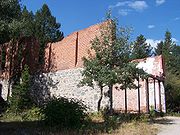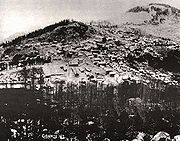
Granite, Montana
Encyclopedia

Ghost town
A ghost town is an abandoned town or city. A town often becomes a ghost town because the economic activity that supported it has failed, or due to natural or human-caused disasters such as floods, government actions, uncontrolled lawlessness, war, or nuclear disasters...
in Granite County, Montana
Granite County, Montana
-National protected areas:*Deerlodge National Forest *Lolo National Forest -Demographics:As of the census of 2000, there were 2,830 people, 1,200 households, and 784 families residing in the county. The population density was 2 people per square mile . There were 2,074 housing units at an average...
, United States
United States
The United States of America is a federal constitutional republic comprising fifty states and a federal district...
, east of the town of Philipsburg
Philipsburg, Montana
Philipsburg is a town in and the county seat of Granite County, Montana, United States. The population was 914 at the 2000 census. The town was named after the famous mining engineer Philip Deidesheimer, who designed and supervised the construction of the ore smelter around which the town...
. Granite thrived as a silver mining town in the 1890s, but is now completely deserted.
History

Granite eventually grew to a town with more than 3,000 inhabitants. For the time period, there were many modern amenities, such as the large Miner's Union Hall, a library, 18 saloons, brothels, a hospital, school, as well as churches.
The Sherman Silver Purchase Act
Sherman Silver Purchase Act
The Sherman Silver Purchase Act was enacted on July 14, 1890 as a United States federal law. It was named after its author, Senator John Sherman, an Ohio Republican, chairman of the Senate Finance Committee...
was repealed in 1893, drastically lowering the price of silver, and many residents left Granite, leaving only 140 residents a year later. Granite is currently entirely uninhabited.

